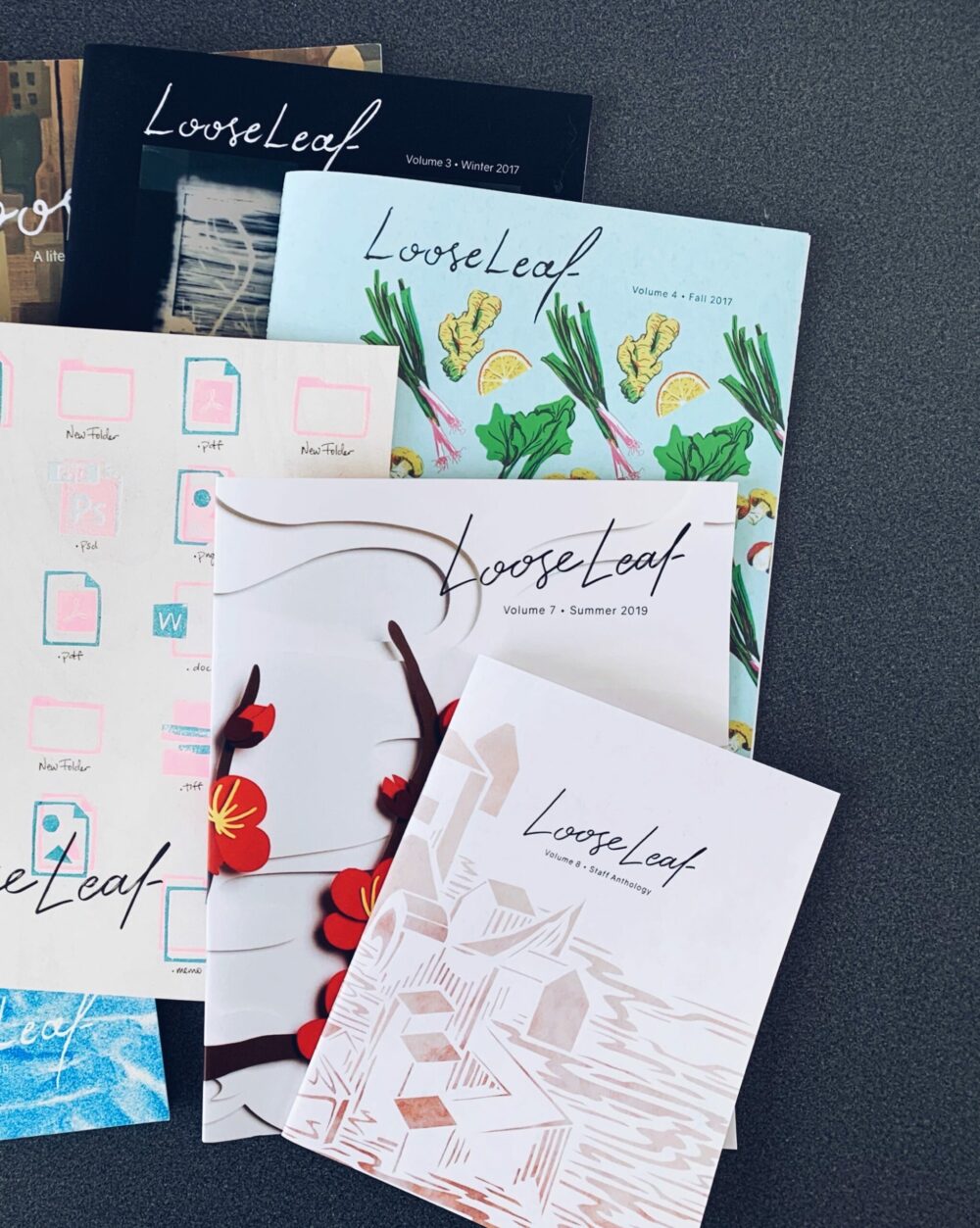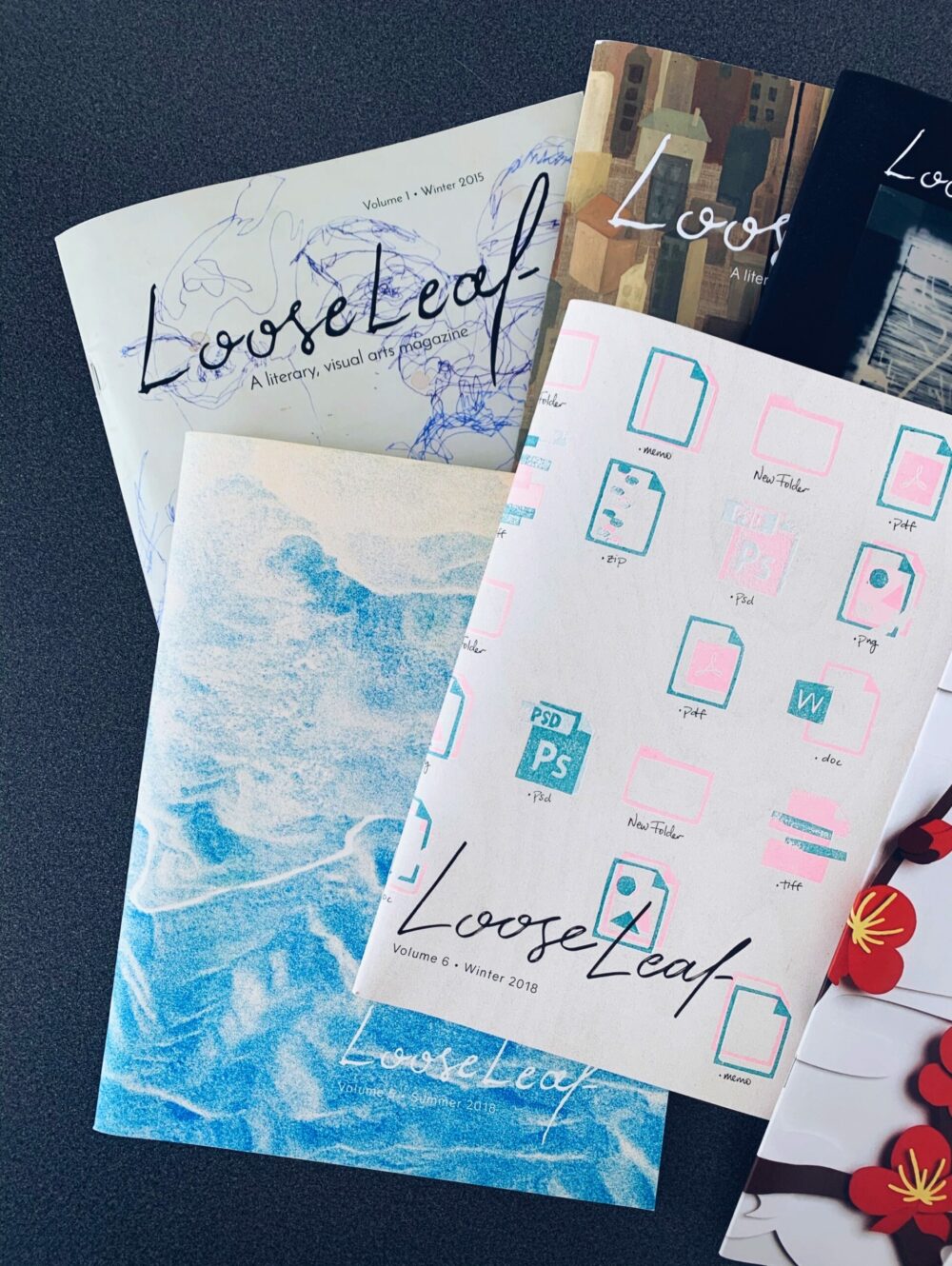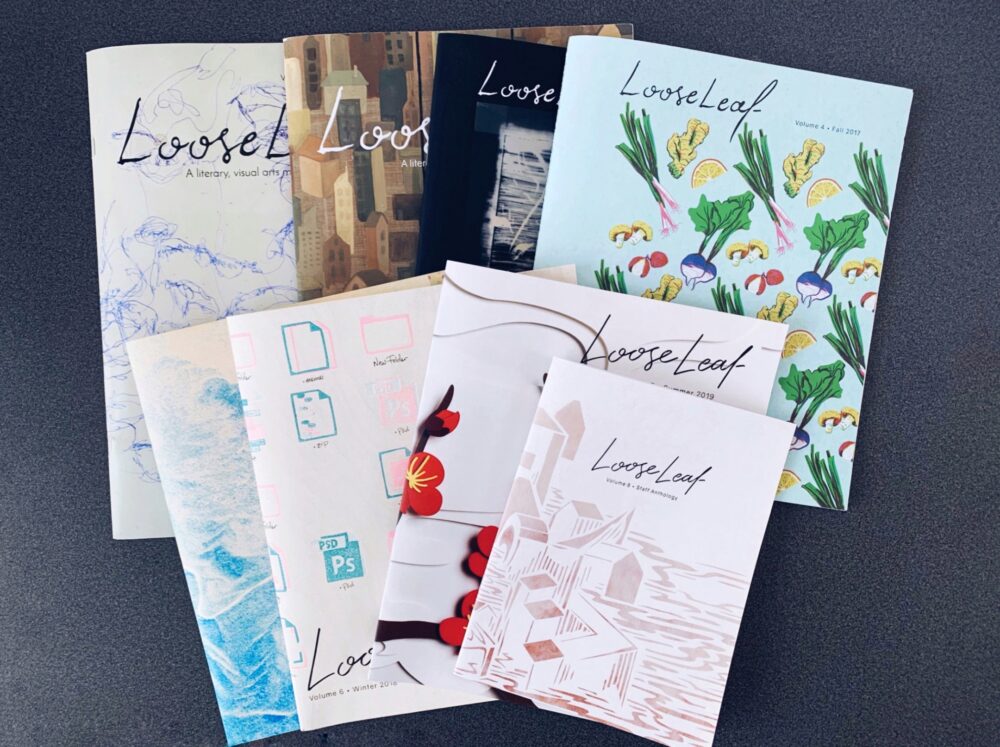from LooseLeaf Magazine
In 2015 I had a wild dream to start a publication for pan-Asian writers and artists, and that winter, in partnership with a bunch of equally naive and down-for-anything Asian creatives, LooseLeaf Magazine emerged. Like a lot of other grassroots and self-starting initiatives emerging at the time, LooseLeaf was a passionate response to calls for diversity and BIPOC platforms. Since then, we’ve published eight volumes featuring a mix of Asian creators from a variety of disciplines, expanded from a print-only magazine to hosting pop-up exhibitions, and developed a digital platform featuring film, music and web-based work.
The possibility of building this platform to support the incredible expanse of pan-Asian community perspectives was intriguing and exciting. Magazines capture and interpret time from volume to volume in continuous and discontinuous ways. They serve as snapshots of time and enduring artifacts.
LooseLeaf’s existence as a publication has definitely contributed in its own small and unique ways to the larger dialogue of “diversity” across the literary arts scene. As we’ve expanded and written grants for ourselves, we’ve become ever-conscious of the need in this industry to brand and identify who we are, to verbalize our target demographic, to prove impact and relevance through numbers, success stories, and persuasive rhetoric.
We’ve been warned about a dying magazine industry and celebrated the resilience of indie publishing and zines. We’ve borne witness to and navigated CanLit’s tenuous dumpster fires and worked through incidents of repeated racism both directed at and perpetuated by Asian communities. We’ve attended countless launches of other BIPOC magazines and gathered with artists in food and conversation. Over the years, our masthead has transitioned from students to a scrappy crew of future academics, cultural producers, and arts programmers. As we’ve grown in size, we’ve also become a constant touchpoint for arts organizations looking for Asian-Canadian content, and Asian reviewers covering theatre, exhibitions, and literature on our blog.

In the summer of 2020, LooseLeaf Magazine was to double-launch Volume Nine and Ten and wrap its run as a magazine. This was not in response to a loss of funding, a problem with staffing, or burnout.
LooseLeaf Magazine is about the collaborative and creative act of inviting voices to tumble over and around each other, whether it be through who we feature in our table of contents, or through production conversations in our chats and editing boards. We also have to contend, as creators, with our voices being interpreted through the lens of diversity dialogue. This is always simultaneously a wonderful opportunity and a heavy responsibility. Within these negotiations, the masthead’s responses and feelings toward our responsibilities are varied and complex—as it should be. When I first mentioned the likelihood of LooseLeaf stopping at ten volumes, there were a few long conversations where we explored the possibility of continuing operations or potentially handing it off to new staff. This is tempting in some way. It is a practical inheritance that younger emerging Asian publishers and editors can wield to gain access to grant funding and other opportunities. It ensures the continuity of a platform. It feels like the work we’ve done so far won’t be “wasted.”
Yet, after every conversation, choosing to cap LooseLeaf at ten volumes seems true to our original vision. In a landscape where continuity, longevity, and industrializing seem to be the only sure-fire ways to achieve impactful change, this decision is an exercise of freedom to pursue multiple visions of futurity. The general buzz in the masthead has evolved into shared understanding, and more importantly, shared excitement.
Where could all of us go after this? What other things could we do?
LooseLeaf is not about a singular, unified vision of community, but about holding a plenitude of visions amongst communities. In other words, LooseLeaf’s vision is abundance—not just an offering of abundance, but first and foremost, a working from abundance. We already know that plenitude exists in our communities. We believe this plenitude precedes our publication and will outlast us: the stories, the histories, the forms, the subjectivities, the conversations, the craft. We hold this perspective to understand who we are in relation to our communities, to neither over-inflate nor undermine the work that we do.
As a grassroots publication, we operate with the understanding that our community’s abundance does not need to be proven to anybody. LooseLeaf is a reminder for us to experience joy in celebrating this plenitude over and over again.
I am not against longevity, but I have an impulse to celebrate the many forgotten publications and creative acts that have answered calls in their spaces and time, for their creators and communities, that no longer exist.
I recognize that these intentional but impermanent actions are as generative and impactful as the structures we build that survive and evolve through multiple eras.

When I lay out all of LooseLeaf’s Letters From the Editor side-by-side, I see the impact of our communities growing over the years. I trace the evolving approaches to problems we face within and across generations. I witness my inheritance—language and imagination—expanding in collective breath. I become familiar with the way questions mature into hope, answers, and new questions.
Our biannual publication prints a tiny run of 150 copies each volume. We circulate largely within the Greater Toronto Area. We cannot afford to carry our magazines in bookstores, nor are we able to accommodate requests for reprints when things sell out. Yet I never take for granted the crackling energy of our launches, when the room fills with folks old and new, in varying stages of creative career, from many disciplines and interests, carrying different political and professional burdens. Over the years, we’ve celebrated life and death together, hosted debut performances and mature presentations, developed passions and responded to calls to action. From the exhilarating rush of Volume One, the overcrowding and spillover of Volume Four attendance, the open grieving during Volume Six, and an unexpected group cry at Volume Seven-Eight, every launch has allowed me to bear witness to our publication creating space for our joy, exuberant and precarious.
The magazine space is a coalescing of visions, and I’ve come to understand, over the years, that creative synergy comes from meeting over and over in commitment to people we love and stories we long for. LooseLeaf is a space that sprouted and bloomed in and for its time. It is a space our community gathered to celebrate and grow in. Soon, we’ll depart from it to dream other dreams.
For our masthead, the season after LooseLeaf will be one of rest and bearing other forms of witness: we’ll participate in the creative practice and labour required to tell our stories; we’ll attend other spaces that want our presences; we’ll be readers and curators for other publications; we’ll share strategies; we’ll submit our own words to exist in someone else’s pages; we’ll vision in changing constellations.
The long event in my life that is LooseLeaf has taught me how to hold and practice abundance as a constant. I dream that our journeys out from this magazine are more liberated and responsible, more equipped to uplift the voices we want to hear, and more ready to imagine the futures we need to live.
Jasmine Gui is the founder of Project 40 Collective, a pan-Asian interdisciplinary artist collective, managing editor at LooseLeaf Magazine, and runs Teh People Studio. She was a panellist on the Lit Mag Love webinar panel that ended up being one of the few programmed events at the 2020 Growing Room Literary & Arts Festival to actually happen in the wake of COVID-19 precautions.
We are so pleased to feature Jasmine’s essay,” Notes on Abundance,” which was written as a reflection on what it meant to intentionally close down a magazine in a climate where we are often being called to exist and persist, in order to do good work and sustain impact. It’s a personal reflection on how to envision abundance, community care, and value in our work but also beyond the set forms of work.
You can continue to support and celebrate the rest of our Growing Room artists by ordering issue 44.1 Growing Room online, and watch this space as we share more content from contributors to the Growing Room 44.1 issue all throughout the month of March.














